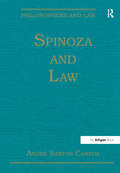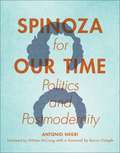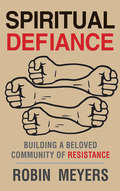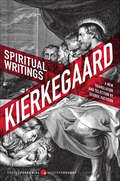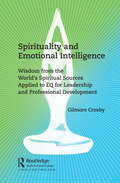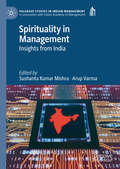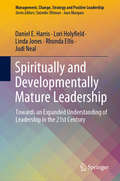- Table View
- List View
Spinoza Dictionary
by Dagobert D. RunesThis A-to-Z reference volume presents definitions, propositions, and explanations of Spinoza&’s thought—all in the philosopher&’s own words. The seventeenth-century philosopher Baruch Spinoza remains one of the most significant thinkers of our time. Yet his works, written in a rigidly geometric form of argumentation, are notoriously difficult to navigate. Expertly edited by Dagobert D. Runes, Spinoza Dictionary presents an alphabetical selection of Spinoza&’s own writings, making essential definitions, concepts, and passages immediately accessible. In his introduction, Runes sheds new light on Spinoza&’s private, political, and religious life, and exposes and explains the dramatic story of his apostasy. If the reader despairs of finding his way through Spinoza&’s works, here he will find a reliable guide speaking in Spinoza&’s own words. &“The grand ideas of Spinoza&’s Ethics are brought out clearly in this book: not less than the heroic illusions of this great and passionate man.&” —Albert Einstein
Spinoza His Life and Philosophy [2nd Edition]
by Sir Frederick Pollock Johannes ColerusSir Frederick Pollock (1845-1937), Corpus Professor of Jurisprudence at the University of Oxford, is best known as the founding editor of the Law Quarterly Review, and for his correspondence with Justice Oliver Wendell Holmes of the US Supreme Court. This biography of the Dutch philosopher Spinoza (1632-1677) was designed to be accessible to the general reader as well as 'critical students of philosophy’,This second edition includes “The life of Spinoza, by Colerus”.
Spinoza and Law
by AndreSantos CamposThis volume collects some of the best writings on Spinoza�s philosophy of law and includes a critical examination of Spinoza�s theory of the types of law, his natural law theory, as well as the modern reformulation of his approach to the nature of laws and to natural rights. This collection of essays (some of which are published in the English language for the very first time) shows how Spinoza was able to deliver a revolutionary idea of natural law that breaks away from the traditions of natural law and of legal positivism. The bulk of Spinoza�s references to law derive from his metaphysical and political texts, but they have sufficient depth in order to form a groundbreaking theory of law that has been somewhat neglected by modern jurisprudence. The volume also features an introduction which places Spinoza�s writings in the context of modern jurisprudence as well as an extensive bibliography. It is suited to the needs of jurisprudence scholars, teachers and students and is an essential resource for all law libraries; it is also essential to anybody who wishes to engage in Spinoza studies nowadays, whose practical philosophy has received a recent boom in attention by readers throughout the world.
Spinoza for Our Time: Politics and Postmodernity (Insurrections: Critical Studies in Religion, Politics, and Culture)
by Antonio NegriAntonio Negri, one of the world's leading scholars on Baruch Spinoza (1632–1677) and his contemporary legacy, offers a straightforward explanation of the philosopher's elaborate arguments and a persuasive case for his ongoing relevance. Responding to a resurgent interest in Spinoza's thought and its potential application to contemporary global issues, Negri demonstrates the thinker's special value to politics, philosophy, and related disciplines.Negri's work is both a return to and an advancement of his initial affirmation of Spinozian thought in The Savage Anomaly. He further defends his understanding of the philosopher as a proto-postmodernist, or a thinker who is just now, with the advent of the postmodern, becoming contemporary. Negri also connects Spinoza's theories to recent trends in political philosophy, particularly the reengagement with Carl Schmitt's "political theology," and the history of philosophy, including the argument that Spinoza belongs to a "radical enlightenment." By positioning Spinoza as a contemporary revolutionary intellectual, Negri addresses and effectively defeats twentieth-century critiques of the thinker waged by Jacques Derrida, Alain Badiou, and Giorgio Agamben.
Spinoza's Ethics
by Benedictus de SpinozaAn authoritative edition of George Eliot's elegant translation of Spinoza's greatest philosophical workIn 1856, Marian Evans completed her translation of Benedict de Spinoza's Ethics while living in Berlin with the philosopher and critic George Henry Lewes. This would have become the first edition of Spinoza's controversial masterpiece in English, but the translation remained unpublished because of a disagreement between Lewes and the publisher. Later that year, Evans turned to fiction writing, and by 1859 she had published her first novel under the pseudonym George Eliot. This splendid edition makes Eliot's translation of the Ethics available to today's readers while also tracing Eliot's deep engagement with Spinoza both before and after she wrote the novels that established her as one of English literature's greatest writers.Clare Carlisle's introduction places the Ethics in its seventeenth-century context and explains its key philosophical claims. She discusses George Eliot's intellectual formation, her interest in Spinoza, the circumstances of her translation of the Ethics, and the influence of Spinoza's ideas on her literary work. Carlisle shows how Eliot drew on Spinoza's radical insights on religion, ethics, and human emotions, and brings to light surprising affinities between Spinoza's austere philosophy and the rich fictional worlds of Eliot's novels.This authoritative edition demonstrates why George Eliot's translation remains one of the most compelling and philosophically astute renderings of Spinoza's Latin text. It includes notes that indicate Eliot's amendments to her manuscript and that discuss her translation decisions alongside more recent English editions.
Spinoza's Religion: A New Reading of the Ethics
by Clare CarlisleA bold reevaluation of Spinoza that reveals his powerful, inclusive vision of religion for the modern ageSpinoza is widely regarded as either a God-forsaking atheist or a God-intoxicated pantheist, but Clare Carlisle says that he was neither. In Spinoza’s Religion, she sets out a bold interpretation of Spinoza through a lucid new reading of his masterpiece, the Ethics. Putting the question of religion centre-stage but refusing to convert Spinozism to Christianity, Carlisle reveals that “being in God” unites Spinoza’s metaphysics and ethics. Spinoza’s Religion unfolds a powerful, inclusive philosophical vision for the modern age—one that is grounded in a profound questioning of how to live a joyful, fully human life.Like Spinoza himself, the Ethics doesn’t fit into any ready-made religious category. But Carlisle shows how it wrestles with the question of religion in strikingly original ways, responding both critically and constructively to the diverse, broadly Christian context in which Spinoza lived and worked. Philosophy itself, as Spinoza practiced it, became a spiritual endeavor that expressed his devotion to a truthful, virtuous way of life. Offering startling new insights into Spinoza’s famously enigmatic ideas about eternal life and the intellectual love of God, Carlisle uncovers a Spinozist religion that integrates self-knowledge, desire, practice, and embodied ethical life to reach toward our “highest happiness”—to rest in God.Seen through Carlisle’s eyes, the Ethics prompts us to rethink not only Spinoza but also religion itself.
Spinoza, Ecology and International Law: Radical Naturalism in the Face of the Anthropocene (Law, Justice and Ecology)
by Moa De Lucia DahlbeckThis book addresses the use of Benedict Spinoza’s philosophy in current attempts to elaborate an ecological basis for international environmental law. Because the question of environmental protection has not been satisfactory resolved, the legal debate concerning our responsibility for the environment has – as evidenced in the recent UN report series Harmony with Nature – come to invite calls for a new eco-centric, rather than anthropocentric, legal paradigm. In this respect, Spinoza appears as a key figure. He is one of the few philosophers in the history of western philosophy who cares, and writes extensively, about the roots of anthropocentrism; the core issue of contemporary normative debates in ecology. And in response to the rapidly developing ecological crisis, his work has become central to a re-thinking of the human relationship with nature. Addressing the contention that Spinoza’s ethics might provide a useful source for developing a new, eco-centred framework for environmental law, this book elaborates a more nuanced understanding of Spinoza’s philosophy. Spinoza cannot, it is argued here, simply be reduced to an eco-ethicist. That is: his metaphysics cannot be used as basis of an essentially naturalised or extended human morality. At the same time, however, this book argues that the radicality of Spinoza’s naturalism nevertheless offers the possibility of developing a more adequate ecological basis for environmental law.
Spinoza, Right and Absolute Freedom: Spinoza, Right And Absolute Freedom (Birkbeck Law Press)
by Stephen ConnellyAgainst jurisprudential reductions of Spinoza’s thinking to a kind of eccentric version of Hobbes, this book argues that Spinoza’s theory of natural right contains an important idea of absolute freedom, which would be inconceivable within Hobbes’ own schema. Spinoza famously thought that the universe and all of the beings and events within it are fully determined by their causes. This has led jurisprudential commentators to believe that Spinoza has no room for natural right – in the sense that whatever happens by definition has a ‘right’ to happen. But, although this book demonstrates how Spinoza constructs a system in which right is understood as the work of machines, by fixing right as determinate and invariable, Stephen Connolly argues that Spinoza is not limiting his theory. The universe as a whole is capable of acting only in determinate ways but, he argues, for Spinoza these exist within a field of infinite possibilities. In an analysis that offers much to ongoing attempts to conceive of justice post-foundationally, the argument of this book is that Spinoza opens up right to a future of determinate interventions –as when an engineer, working with already-existing materials, improves a machine. As such, an idea of freedom emerges in Spinoza: as the artful rearrangement of the given into new possibilities. An exciting and original contribution, this book is an invaluable addition, both to the new wave of interest in Spinoza’s philosophy, and to contemporary legal and political theory.
Spiral: Trapped in the Forever War
by Mark Danner"[A] chilling cautionary tale of Orwellian repercussions." --Kirkus Reviews Trapped in a forever war by 9/11, in Spiral Mark Danner describes a nation that has been altered in fundamental ways. President Bush declared a war of choice and without an exit plan, and President Obama has proven unable to take the country off what he has called its "permanent war footing."The War on Terror has led to fourteen years of armed conflict, the longest war in America's history. Al Qaeda, the organization that attacked us on 9/11, has been "decimated" (the word is Obama's) but replaced by multiple jihadist and terror organizations, including the most notorious--ISIS. Spiral is what we can call a perpetual and continuously widening war that has put the country in a "state of exception." Bush's promise that we have "taken the gloves off" and Obama's inability to define an end game have had a profound effect on us even though the actual combat is fought by a tiny percentage of our citizens. In the name of security, some of our accustomed rights and freedoms are circumscribed. Guantanamo, indefinite detention, drone warfare, enhanced interrogation, torture, and warrantless wiretapping are all words that have become familiar and tolerated. And yet the war goes badly as the Middle East drowns in civil wars and the Caliphate expands and brutalized populations flee and seek asylum in Europe. In defining the War on Terror as boundless, apocalyptic, and unceasing, we have, Danner concludes, "let it define us as ideological crusaders caught in an endless war."
Spiritual Capital: Wealth We Can Live by
by Danah Zohar Ian MarshallOur world is at a crossroads; we must choose between two alternatives. The first is capitalism as we know it today-an amoral culture of short-term self-interest, profit maximization, emphasis on shareholder value, isolationist thinking, and profligate disregard of long-term consequences. Based on narrow assumptions about human nature and motivation, this system is unsustainable, a monster set to consume itself. The second alternative is "spiritual capital"-a values-based business culture in which wealth is accumulated in order to generate a decent profit while acting to raise the common good. Rather than emphasizing shareholder value, spiritual capital emphasizes "stakeholder value," where stakeholders include the whole human race, present and future, and the planet itself. Spiritual capital nourishes and sustains the human spirit. The crucial question is how we can move from one alternative to the other-how we can move from present-day business capitalism to Spiritual Capital. Danah Zohar and Ian Marshall introduce the concept of spiritual intelligence (SQ), and describe how it can be used to shift individuals and our culture from a state of acting from lower motivations (fear, greed, anger, and self-assertion) to one of acting from higher motivations (exploration, cooperation, power-within, mastery, and higher service). Zohar and Marshall describe how this shift actually happens a given organizational culture. They look in depth at the issues that dominate corporate culture and how they are influenced by the processes of SQ transformation and discuss the leadership elite who must be the ones to bring about and embody this cultural shift. Finally, Zohar and Marshall argue that spiritual capital is still a valid and workable form of capitalism and detail what we, as individuals, can do to make it happen.
Spiritual Defiance
by Robin MeyersDuring his thirty-year career as a parish minister and professor, Robin Meyers has focused on renewing the church as an instrument of social change and personal transformation. In this provocative and passionate book, he explores the decline of the church as a community of believers and calls readers back to the church's roots as a community of resistance. Shifting the conversation about church renewal away from theological purity and marketing strategies that embrace cultural norms, and toward "embodied noncompliance" with the dominant culture, Meyers urges a return to the revolutionary spirit that marked Jesus's ministry. Framing his discussion around three poems by twentieth-century Polish poet Anna Kamienska, Meyers casts the nature of faith as a force that stands against anything and everything that engenders death and indignity. He calls for active--sometimes even subversive--defiance of the ego's temptations, of what he terms "the heresy of orthodoxy itself," and of an uncritical acceptance of militarism and capitalism. Each chapter is a poignant and urgent invitation to recover the Jesus Movement as a Beloved Community of Resistance.
Spiritual Envy
by Michael KrasnyAs the host of one of National Public Radio's most popular interview programs, Michael Krasny has spent decades leading conversations on every imaginable topic and discussing life's most important questions with the foremost thinkers of our time. Now he brings his wide-ranging knowledge and perceptive intelligence to a thoughtful and thought-provoking exploration of belief; and lack of belief. Many books and pundits advocate for a specific God, while others adamantly declare there is no God. Yet these strident viewpoints often speak right past each other, rarely convincing anyone but the already convinced. In -- Spiritual Envy -- Krasny helps believers and nonbelievers alike understand their own questions about faith and religion, about God and human responsibility. Krasny challenges each of us to look closely at faith and its power, and to examine the positive and negative aspects of religion as expressed in culture, literature, and human relationships. Personal and universal, timely and timeless, this is a deeply wise yet warmly welcoming conversation, an invitation to ask one's own questions; no matter how inconclusive the answers.
Spiritual Leadership: Mit Fokus und Achtsamkeit zum Kern wirksamer Selbst-Führung
by Thomas H. UlrichSpiritual Leadership fokussiert auf das, was man über sein Selbst erfahren kann, und wie man an seinem Selbst arbeiten kann. Das Buch stellt ein dynamisches Schichtenmodell des Selbst vor, mit innerer Centricity als Kern. Führungskräfte erfahren, wie sie an den verschiedenen Ebenen ihrer Persönlichkeit arbeiten können, um Centricity zu erreichen – das am eigenen Wesenskern ausgerichtete innere Gleichgewicht, das Grundlage wirksamer Führung in der VUCA-Welt sowie Basis persönlicher Authentizität und natürlicher Autorität ist.Spiritual Leadership verbindet klassische Leadership-Theorien und Modelle der Authentic Leadership mit Konzepten der Philosophie und der von kontemplativen Bewusstseinstechniken inspirierten Achtsamkeits- und Mindfulness-Bewegung.Praktische Übungsaufgaben und anschauliche Anwendungsbeispiele unterstützen die Anwendung des Konzepts im beruflichen und privaten Alltag.
Spiritual Writings: A New Translation and Selection (Harper Perennial Modern Thought Ser.)
by Søren Kierkegaard George Pattison“By far the most profound thinker of the 19th century” —Ludwig Wittgenstein “Kierkegaard’s great contribution to Western philosophy was to assert, or to reassert with Romantic urgency, that, subjectively speaking, each existence is the center of the universe.” —John Updike, The New YorkerHarper Perennial Modern Classics presents the rediscovered spiritual writings of Søren Kierkegaard, edited and translated by Oxford theologian George Pattison. Called “the first modernist” by The Guardian and “the father of existentialism” by the New York Times, Kierkegaard left an indelible imprint on existential writers from Sartre and Camus to Kafka and Derrida. In works like Fear and Trembling, Sickness unto Death, and Either/Or, he by famously articulated that all meaning is rooted in subjective experience—but the devotional essays that Patterson reveals in Spiritual Writings will forever change our understanding of the great philosopher, uncovering the spiritual foundations beneath his secularist philosophy.
Spirituality Within Religious Traditions in Social Work Practice
by Mary Van Hook Beryl Hugen Marian AguilarThis text for social workers and other counselors discusses how religious traditions shape people's lives and help them construct meaning about the world around them. Each of the 14 contributions from academics and clinicians describes the history of a particular religion, some of its rituals, basic beliefs, and its implications for social work practice. Some of the faiths profiled include Islam, Judaism, Native American spirituality, Hinduism, Buddhism, Catholicism, Mormonism, and the African-American Baptist tradition. Annotation c. Book News, Inc., Portland, OR (booknews.com)
Spirituality and Business in the Anthropocene: Insights from Hinduism, Christianity, Buddhism and Existential Humanism (Palgrave Studies in Sustainable Business In Association with Future Earth)
by Laszlo ZsolnaiThis contributed volume collects innovative papers by scholars from Europe, India, and the USA to investigate how spirituality can contribute to renewing business in response to the challenges of the Anthropocene era. These challenges include climate change, biodiversity loss, ecosystems collapse, growing inequality, wellbeing deficiencies, and social unrest. Using insights from Christianity, Hinduism, Buddhism, and Existential Humanism the book explores the spiritual aspects of the present ecological, economic, social and ethical crises, materialist worldviews in the Anthropocene and their relation to crises. Further, it reinterprets personalism for embracing ecological values, presents working models of spiritually-based sustainability practices in business, and discusses the integration of spirituality into business education to foster a greater understanding of our interconnectedness with the planet and with each other. Part of the Palgrave Studies in Sustainable Business in Association with Future Earth book series, this interdisciplinary work will be of great interest to scholars and students of sustainability, spirituality in business, leadership, and many other fields.
Spirituality and Business: An Open Letter to Christian Leaders in Times of Urgency
by Philippe de WootAre the demands placed on 21st-century business leaders compatible with Christian values? Is it possible to act ethically and be socially responsible within a global system driven by economic demands? This important book explores the current conflict between spirituality and corporate leadership and asks challenging questions of business leaders and decision-makers.
Spirituality and Emotional Intelligence: Wisdom from the World’s Spiritual Sources Applied to EQ for Leadership and Professional Development
by Gilmore CrosbyThis book weaves together spirituality and a systemic version of emotional intelligence that incorporates Kurt Lewin’s social science and other sources. Emotional intelligence calls on us to be fully present “to the moment.” It calls on us to be appreciative of ourselves and our relationships. Likewise, a calm and compassionate presence is almost universally recognized as a spiritual way of being. In other words, the overwhelming majority of the world’s spiritual sources call on us to be emotionally intelligent and that link is explored with unique clarity in this simple yet powerful text. We are all reactive at times. Becoming more objective and less attached allows us to feel our feelings without being a prisoner to acting on them in habitual ways. From a more detached perspective, feelings are neither good nor bad, but simply clues as to how we are perceiving our environment, especially our social environment. This is especially important in terms of our relationships at work. Our perceptions about what people intend trigger our emotional reactions. Think about the difference when you perceive critical feedback as a sincere attempt to help or when you perceive it as an attack of some sort. Perception evokes different emotional responses. Objectivity about our own perception is even more important than objectivity about emotion, because the former usually precedes the later. Paradoxically, being detached allows one to appreciate and experience one’s emotions more fully. Recognizing emotion as part of your inner guidance system instead of as something dangerous that must be controlled or denied is freeing. The less emotion runs you, the more you can accept feeling what you feel. Emotion is a form of physical energy. Fighting your own feelings takes energy. Allowing the ebb and flow of emotion is essential to physical and emotional health and to accepting ourselves as we are.
Spirituality and Ethics in Management
by Laszlo ZsolnaiThe book - which was originally published by Kluwer in 2004 - is a collection of scholarly papers focusing on the role of spirituality and ethics in renewing the contemporary management praxis. The basic argument is that a more inclusive, holistic and peaceful approach to management is needed if business and political leaders are to uplift the environmentally degrading and socially disintegrating world of our age. The book uses diverse value-perspectives (Hindu, Catholic, Buddhist, and Humanist) and a variety of disciplines (philosophy, ethics, management studies, psychology, and organizational sciences) to extend traditional reflections on corporate purpose and focuses on a self-referential organizational-existential search for meaning, identity and success.
Spirituality in Management: Insights from India (Palgrave Studies in Indian Management)
by Arup Varma Sushanta Kumar MishraWith spirituality being brought to the fore of management and organisation studies, this timely collection takes a closer look at the relationship between religion and work in India. Bringing together experts from various backgrounds, this book provides a comprehensive review of the topic, addressing its key underpinnings and complexities. Spirituality in Management is divided into four sections, covering the evolution of workplace spirituality, its causes, characteristics and outcomes, and culminating in a critical analysis. A thought-provoking read for scholars, students and policy-makers, this book provides an Indian perspective on managing spirituality at work, and offers insights into successful organisational practice.
Spirituality, Sport, and Doping: More than Just a Game (SpringerBriefs in Religious Studies)
by Tracy J. TrothenThis book explores the deeper meaning of sports. Drawing on contemporary research, the author makes a strong case for why we should see sport not only in terms of religion but--more importantly-as a possible location for spiritual meaning. Taking this a step farther, she considers how gene editing, robotics, and other biomedical technological enhancements affect not only sports performances but experiences of sport as sacred. In addition, the author explores what difference it might make to the enhancement debate if sports’ spirituality is taken seriously. The author is not afraid to explore the issue in all its complexity. Yet, the argument she presents is both meaningful and accessible. This investigation applies insights from Christian theology, applied ethics, psychology, and sports studies. From lightweight tennis racquets to anabolic steroids, athletes have long used technology and science to improve their performances. But, until now, no one has asked how biomedical technological enhancements might affect the undervalued spiritual dimension of sport. This book presents rich insights into the connection between sports, spirituality, and human enhancement technologies. It will appeal to researchers, athletes and sports followers, and undergraduate and graduate students in ethics, sport, religion or theology.
Spirituality, Sustainability, and Success: Concepts and Cases (Palgrave Studies in Workplace Spirituality and Fulfillment)
by Christopher G. BeehnerThis book offers a pragmatic approach to the benefits of spirituality and sustainability for both individual and organizational success. It introduces sustainability and workplace spirituality as contemporary solutions to the challenging organizational environment. The first few chapters introduce the fundamentals of spirituality, workplace spirituality, and sustainability. The author then demonstrates how the three qualities are beneficial in achieving personal and business success. Through the combination of synthesized research summaries and case studies of individuals and organizations, this book offers readers a fresh perspective on the importance of spirituality and sustainability to organizational performance.
Spirituality, Sustainability, and Success: Concepts and Cases (Palgrave Studies in Workplace Spirituality and Fulfillment)
by Christopher G. BeehnerThis book offers a pragmatic approach to the benefits of spirituality and sustainability for both individual and organizational success. It introduces sustainability and workplace spirituality as contemporary solutions to the challenging organizational environment. The first few chapters introduce the fundamentals of spirituality, workplace spirituality, and sustainability. The author then demonstrates how the three qualities are beneficial in achieving personal and business success. Through the combination of synthesized research summaries and case studies of individuals and organizations, this book offers readers a fresh perspective on the importance of spirituality and sustainability to organizational performance.
Spirituality, Values and Mental Health: Jewels for the Journey
by David Mitchell Andrew Powell Brian Thorne John Swinton Neil Thompson Sarah Carr Peter Gilbert Nigel Mills Azim Kidwai John Foskett Suman Fernando Fozia Sarwar Premila Trevedi Choman Hardi Vicky Nicholls Peter Bates Fatima Kassam Arthur Hawes Cameron Langlands Veronica Dewan Ju Blencowe Julia Head Tom Gordon Frances Basset B Spalek Anne Roberts Paul Grey Mark Bones Ali Jan Haider Barbara Pointon Mary Ellen Coyte Kim Woodbridge Wendy Edwards Christopher Newell Chris Mackenna Abina Parshad-Griffin Thurstine Basset Sarajane Aris Luftha Meah Paul Chapple Bill K. W. M. FulfordSpirituality, religious belief and inclusive faith communities are important for mental well being but mental health practitioners have few guidelines for acknowledging these issues when working with service users. Spirituality, Values and Mental Health gathers together personal and professional contributions from mental health professionals, carers and mental health service users and survivors. It addresses the stigma that can surround both mental health and spirituality and explores the place of the spiritual in mental health care, teasing out its implications for research, education, training and good practice. This book is a welcome source of ideas and common-sense that is essential reading for mental health practitioners, carers and service users, chaplains, faith leaders, faith communities, as well as students and professionals working in the field of spirituality and mental health.
Spiritually and Developmentally Mature Leadership: Towards an Expanded Understanding of Leadership in the 21st Century (Management, Change, Strategy and Positive Leadership)
by Linda Jones Judi Neal Daniel E. Harris Lori Holyfield Rhonda EllisThe book goes beyond theory to offer tools and suggestions for developing emerging leaders. Inspired by the pioneering work of leadership scholar Andre Delbecq, this book points towards an expanded model of leadership that incorporates an active inner life, and posits that such fully human models of leadership will be essential to meet the profound challenges of the 21st Century. Without presuming to provide definitive answers, the text explores central questions such as: What is the added value of spiritual maturity to leadership? Would the integration of mature spirituality with well-developed intellectual and emotional capacities produce more beneficial leadership outcomes for organizations and individuals? What would a spiritually and developmentally mature emerging leader look like in 10 to 20 years? How do we prepare emerging leaders for the challenges they may face; and how do we model spiritually and developmentally mature leadership in ways that resonate with them?Professor Andre Delbecq (1936-2016) of the University of Santa Clara created the heuristic of “spiritually and developmentally mature leaders” to encapsulate his observation that outstanding leaders often seemed to draw strength and wisdom from sources that are not typically studied or taught in leadership courses. Thirty scholars and practitioners accepted Delbecq’s heuristic as the starting point to explore spiritual components of leadership that do not easily lend themselves to quantification or clear causal links. The analysis of their disciplined engagement with the heuristic forms the foundation of an exploratory, fully human understanding of leadership. This analysis is supported by literature reviews, including an overview of Andre Delbecq’s relevant work. Ultimately, the authors call for further collaboration across disciplines and between research and practice to build on the conceptual constructs offered here, and, especially, to create pedagogies for the training of spiritually and developmentally mature leaders


